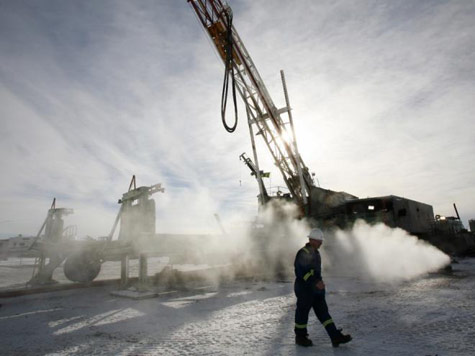
There is a boom coming from the private sector thatlooks to rewrite the American story for the next generation.
It is possibly the life preserver this country needs as it attempts tocorrect itself from decades of expanding debts. These two forcestogether will upend the labor markets of the world. America isbecoming a manufacturing and energy powerhouse once again due to thiscombination punch of robots and the unlocking of untappedresources.
This story has been in the works for a while, but thetechnologies are now beginning to hit escape velocity. When wecombine cheap and domestic energy sources with the latest in roboticautomation, the balance of trade will shift back to our shores,creating a re-shoring renaissance. The rise of these technologies hasbeen chugging along, but until recently, the critical cost point wasnot breached.
The potential lay dormant to the casual observer.Their power is much like a seed in your garden – the ingredientsare all there to make the mightiest redwood from the smallest ofseeds if the conditions are favorable. With a tree, it is thecombination of water, sunlight, and nutrients that facilitate itsgrowth. In the case of our domestic manufacturing base, it is thecheap energy derived from horizontal drilling and fracking combinedwith the marriage of computing power and high-mobility engineering.
Over the last decade, we have all learned what happenswhen businesses using low-priced wages are able to have access towestern markets. We have witnessed the rise of a once poor nation,China, as it replaced Japan as the world’s second largest economy.Jobs that we once did from home have moved to the other side of theworld due to the startling cost advantages associated with manufacturing over there. Luckily for us, the windsof change are now reversing, as American know-how is being applied toovercome the lure of $1.74-an-hour wages. When priced againstautomation and low cost inputs, the equation of where to locatemanufacturing centers begins to shift back home.
Most people know a little about fracking andhorizontal drilling from hyped movies like Gasland,in which someone lights his kitchen tap water on fire to create afalse sense of panic and sell tickets. Sure, there are alwaysconcerns with the adoption of new technologies, but theseenvironmental hurdles can be overcome as long as the costdifferential is wide enough. Natural gas, which costs less than$4.00/MMBtu in the U.S., is more than $10.00/MMBtu in much of Europe.It is in the teens in Asia. We are not talking a few percentagepoints here; we are talking price differentials so large that it willupend the energy markets of the last half-century. America may be thenew Saudi Arabia.
When combining this cheap power and feedstock sourcewith low-cost automation empowered by specialized optics, highlyaccurate sensors, and improved mobility, the re-shoring of Americawill begin to gather steam.
Stepping back, it really doesn’t make alot of sense to ship materials halfway across the globe only to thenship them back. Close contact with suppliers has always been one ofmanufacturing’s greatest obstacles because response time is socritical in the modern and increasingly customized marketplace. The combination of these forces makes domestic production the best choice aslong as the price is right. Going forward, that price is going downmore and more. The result is that America will begin seeing thereturn of lost manufacturing to our shores from places like China.
This re-shoring, of course, will have its detractors.Seeing the replacement of some workers with robots and drilling padsin once-empty fields across the country is bound to scare the public.Media will play into these misplaced fears, but what’s really scaryis America’s economic vulnerability if we don’t move in thisdirection.
Implementing and leveraging these competitiveadvantages in a worldwide marketplace is a national security issuefar greater than the need for another aircraft carrier or forwardpositioning of American soldiers on foreign lands to support two-bitoil-producing dictators. The cost savings alone from the reduction inneed to maintain a massively expensive military force, as well as theprice savings in the average Joe’s food and electric bill, may freeup the economy just enough to begin the critical healing process ofbalancing the federal budget. The recycling of money from neighbor toneighbor, rather than from American to foreigner, will help lowerunemployment and lessen our dependence on welfare programs.
Sure,there may be other technological miracles around the corner, buttoday these are the two best ways to help turn things around and getthe country back on a firm footing. The Terminator will soon be here,but rather than being on a mission to exterminate humanity, he willmore likely be making my next car, which will be powered by American gas andmaintained by my neighbor.

COMMENTS
Please let us know if you're having issues with commenting.